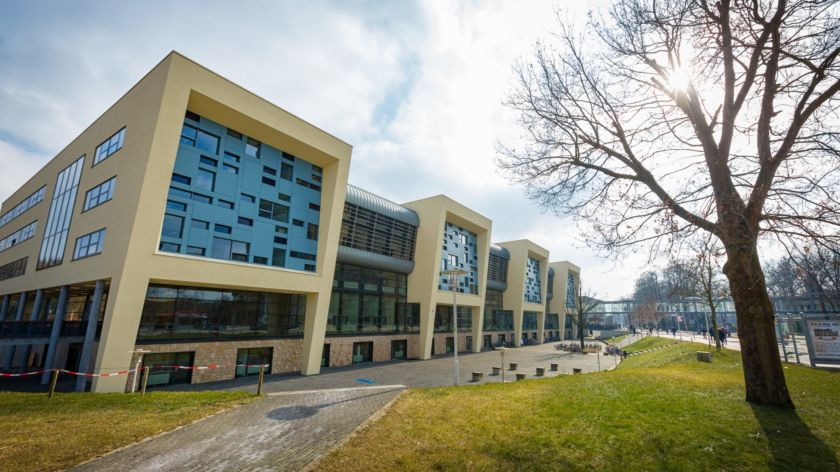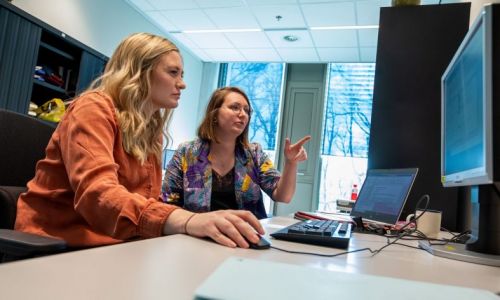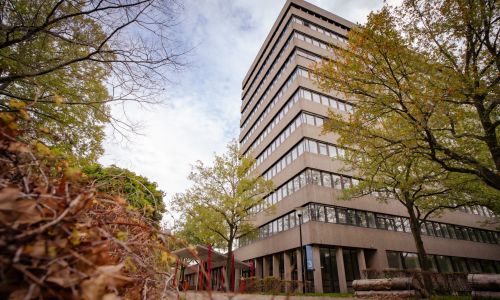-
 Elinor Ostromgebouw. Foto: Dick van Aalst.
Elinor Ostromgebouw. Foto: Dick van Aalst.
The aim of the Nijmegen School of Management to divide four workspaces among five employees, has provoked unrest within the participational bodies. ‘The savings that come with the new office space plan will be spent on replacing employees suffering from burn-outs.’
Four on five. If the decision is up to the faculty board of the Nijmegen School of Management, that will be the new ratio between the number of workspaces and employees in the Elinor Ostrom building; personal workspaces are outdated.
The number of students in the faculty has sharply increased in the last decade, with the exception of this academic year. With a small delay, there was also an increase in the number of employees. Some of the workspaces had to make way for study workplaces. As a result, there are now too few workspaces left for the employees in the Elinor Ostrom building, which has housed the faculty since 2018. At the same time, many office spaces are empty, as researchers are working from home.
On the stairs
Professor and member of the divisional committee Gaard Kets does not understand the wish of the faculty board to reduce the number of personal workspaces. ‘I don’t think it is right for an employer to tell 20 per cent of their personnel that they won’t have their own workspace’, he says. ‘According to a survey of the Works Council, 74 per cent of the employees at our faculty are in favour of a personal, fixed workspace. Nobody wants this; people constantly approach me about this issue at the coffee machine.’
But then how can office spaces be empty for part of the time? ‘Because many workspaces already have to be shared, people think it’s better to work from home, where they have a quiet place to work on research or preparations for lectures’, Kets explains. ‘But for PhD students and parents of young children that isn’t always an option. Some colleagues have told me that they will try to find a workplace in the city if the flexibilisation endures.’
According to Kets, the division of four workspaces among five colleagues will not work out in practice. ‘The faculty board wants to leave this to the departments, but I don’t believe in that. At my previous employer, there were always too few workspaces on Tuesdays, even though that was our department’s fixed meeting day. As a result, we had no choice but to sit on the stairs or find a workspace in another small building or in the city.’
Burn-out
To reinforce his arguments, the professor dove into the scientific literature. ‘The literature shows a link between flexibilisation of workspaces and an increase in burn-outs’, says Kets, who has heard from several colleagues that their burn-out can be partly traced back to the lack of fixed workspaces. ‘I think that’s terrible. That is why the participational bodies have requested a risk assessment from the faculty board: how will these new plans affect the mental and social well-being of employees?’
‘This policy is at the expense of the quality of research and education’
According to Kets, , this new policy also can’t be defended from a business perspective. ‘The savings that come with the new office space plan will be spent on replacing employees suffering from burn-outs. This way, this policy is at the expense of the quality of research and education. All big companies that started with this plan twenty years ago, are now trying to encourage employees to return to the office by offering good facilities and everything that comes with that.’
Investment
When the faculty board will implement the new policy and what it will look like in practice is still unclear. Due to objections from the participational bodies and employees, the implementation has been temporarily suspended. Executive director Monic Schijvenaars explains that she is unable to talk about the specifics. ‘I have only been working in this position for a few weeks and I am currently familiarising myself with this role’, she writes in an e-mail.
According to Kets, it is clear what should happen: the faculty must invest in fixed workspaces for all employees, either by constructing new buildings or by renting extra spaces. ‘An investment in accommodation is an investment in good education and research.’
Translated by Sophie Verhoeven




